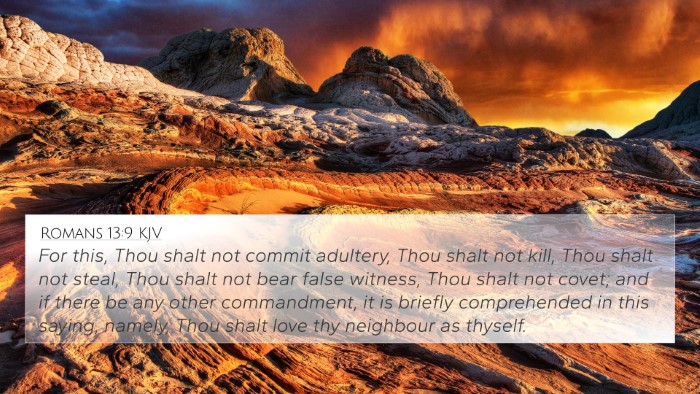Meaning of Deuteronomy 5:17
Deuteronomy 5:17 states, "You shall not murder." This commandment is a fundamental principle of ethical conduct that reflects the sanctity of human life.
Summarized Insights from Public Domain Commentaries
The interpretations of Deuteronomy 5:17 reveal profound theological and ethical implications. Drawing insights from the esteemed commentaries of Matthew Henry, Albert Barnes, and Adam Clarke, we can explore the verse's meaning deeply.
Matthew Henry's Commentary
Matthew Henry emphasizes the moral law that underlies this commandment. He notes that "murder" refers not only to the act of killing but also to harboring hatred in one's heart. According to Henry, this commandment seeks to instill respect for life, both in actions and thoughts, highlighting God's authority over life and death.
Albert Barnes' Commentary
Albert Barnes analyzes the command by stating its implications regarding the value placed on human beings as created in God's image. He affirms that this prohibition against murder embraces a broader notion that includes the protection of life and the necessity of nurture in society to promote collective well-being.
Adam Clarke's Commentary
Adam Clarke offers a practical understanding of this commandment. He points out that the prohibition against murder focuses on preventing unjustifiable violence and promoting peace among individuals. Clarke further emphasizes the importance of keeping one's heart pure and engaging in actions and thoughts that reflect love and reverence for God's creation.
Related Bible Cross-References
- Exodus 20:13: "You shall not murder." This is the direct parallel commandment found in the Ten Commandments.
- Matthew 5:21-22: Jesus expands on this commandment, highlighting the danger of anger and calling us to deeper righteousness.
- 1 John 3:15: This verse informs us that anyone who hates their brother is a murderer, emphasizing the internal motives behind murder.
- Genesis 9:6: Here, God declares the sanctity of human life, affirming that murder is a grave sin against His image in humanity.
- Romans 13:9: The Apostle Paul reiterates that murder is part of the larger law of love that governs Christian conduct.
- Proverbs 6:16-17: This passage includes a list of things the Lord hates, including hands that shed innocent blood, aligning with the condemnation of murder.
- James 4:1-2: This scripture speaks to the root causes of conflict, pointing to desires that lead to murder.
Thematic Bible Verse Connections
By exploring the connections between Bible verses, we can draw a comprehensive understanding of the moral implications of Deuteronomy 5:17, not just in its legalistic sense but also in its relational context.
Inter-Biblical Dialogues on Murder
The theme of murder is further explored through various narratives and teachings throughout the Scriptures. Each reference contributes to a robust understanding of the sanctity of life:
- Cain and Abel (Genesis 4): This tragic story illustrates the first act of murder driven by jealousy, showing the devastating consequences of sin.
- Matthew 26:52: Jesus advises, “For all who take the sword will perish by the sword,” indicating the futility and danger of resorting to violence.
- Luke 9:54-55: When the disciples suggest calling down fire on a Samaritan village, Jesus rebukes them, indicating a profound understanding of God’s mercy.
Tools for Bible Cross-Referencing
Utilizing various tools for Bible cross-referencing will enhance your understanding and study of Deuteronomy 5:17. Resources such as Bible concordances and Bible cross-reference guides are invaluable for linking scriptures together effectively.
How to Use Bible Cross-References
Understanding cross-references provides insight into how particular scriptures relate to one another, fostering a deeper comprehension of biblical themes. Here are some suggestions:
- Use a Bible cross-reference system to find related verses that enhance your study.
- Engage in cross-reference Bible study methods to gather contextual themes connecting the old and new testaments.
- Identify connections between biblical texts, enabling a comparative analysis that can aid in sermon preparation or personal study.
Conclusion
The commandment "You shall not murder" in Deuteronomy 5:17 serves as a profound reminder of the sanctity of human life. Through cross-referencing with other biblical texts, one can fully appreciate the gravity of this directive, gain insights into God's heart, and find guidance in fostering a community that values life and peace. Biblical cross-references effectively illuminate the intricacies of scripture, creating a tapestry of divine principles and moral teachings that transcend time and culture.








